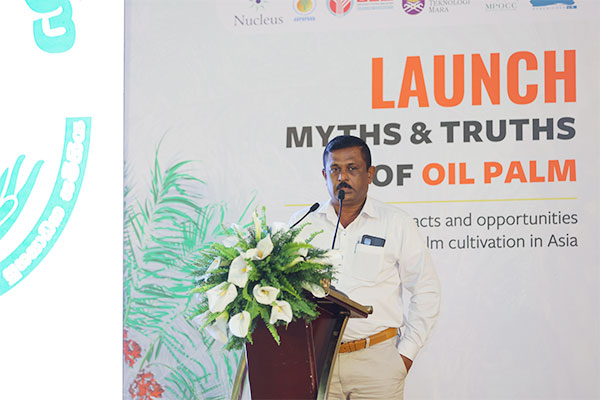Business
Decoding Oil Palm: Myths vs Truths

By Anumita Ghosh
The contents in this article revolves round a scientific research-backed study on oil palm cultivation in the aftermath of the recent ban in Sri Lanka.
Oil palm is considered to be one of the most competitive vegetable oil crops in terms of productivity. The crop provides five times as much vegetable oil per hectare compared to alternative crops, such as coconut, and sequesters more carbon per hectare than tea and coconut. According to studies conducted by Sri Lankan scientists, per litre of palm oil requires lesser fertilisers and less water than coconut, dry rubber or tea. The crop primarily uses rainwater for cultivation, and there is no evidence of palm oil plantations causing groundwater depletion. Yet, despite a wide range of virtues, the Sri Lankan government has decided to ban palm oil production, ordering replacement of oil palm trees with rubber plantations, on grounds of unfavourable environmental and social impacts.
Myths & Truths
 Unfortunately, palm oil has been at the receiving end of a perception that is nurtured based on unfavourable emotions and not facts around it. Claims of oil palm plantations leading to widespread deforestation and damage to ecosystems have hardly any transparent scientific research backing them. In Sri Lanka, oil palm does not replace forest but other plantation crops, primarily rubber or coconut. Therefore, its biodiversity performance needs to be compared with these crops, and as found in various studies, the differences in biodiversity between oil palm, rubber, tea and coconut plantations are neither significant nor conclusive.
Unfortunately, palm oil has been at the receiving end of a perception that is nurtured based on unfavourable emotions and not facts around it. Claims of oil palm plantations leading to widespread deforestation and damage to ecosystems have hardly any transparent scientific research backing them. In Sri Lanka, oil palm does not replace forest but other plantation crops, primarily rubber or coconut. Therefore, its biodiversity performance needs to be compared with these crops, and as found in various studies, the differences in biodiversity between oil palm, rubber, tea and coconut plantations are neither significant nor conclusive.
In an attempt to break the myths around palm oil and its production, Solidaridad has released the “Myths and Truths of Oil Palm”, a research-based scientific study that provides information and assessments on palm oil through an in-depth literature review on research findings by over 15 leading scientists from top universities and research institutions across Indonesia, Malaysia, India and Sri Lanka. A result of extensive research, the publication vividly portrays the social, economic and environmental impacts of oil palm production.
Research highlights
Sri Lanka annually imports 180,000 to 220,000 MT of vegetable oil. This can be met with 50,000 ha of oil palm or 271,000 ha of coconut. Oil palm yields 4 to 5 times oil per ha.
Oil palm plantations have served Sri Lanka for over 54 years, starting around 1968 Palm oil is in many aspects healthier than coconut oil Currently, profits generated per ha/ year; Oil Palm LKR900,000, Coconut LKR280,000, Rubber LKR70,000, Tea LKR45,000 The daily wages per month for workers; Oil palm worker LKR30,000 – LKR50,000, Tea estate worker LKR25,000, Rubber tapper LKR18,000
No evidence has been found of soil and water resource degradation in the oil palm growing estates in Sri Lanka
A worldwide study which included Sri Lanka has shown that in Sri Lanka, the water footprint of coconut oil 10,548 m3water/ton, palm oil 3,946 m3water/ton.
Setting the tone
The launch was organised on 19 January 2022 in a hybrid event with scientists, government ministries and departments, research institutes, private sector, community organisations, media and other participants from Sri Lanka joining the event physically. Panelists and participants from India, Indonesia, Malaysia, the Netherlands and other parts of the world attended the event virtually.
Among the panelists, Dr. Shatadru Chattopadhayay, Managing Director, Solidaridad Asia, began the session on a strong and positive note, highlighting the socio-economic impacts of the crop.
“Stop condemning palm oil while adulating other oils, especially when we know that palm oil provides livelihoods to thousands of communities,” he mentioned, setting the tone of the session.
Professor Maja Slingerland from the Wageningen University of the Netherlands, who is also the study reviewer and editor, spoke at length on the impacts and opportunities of oil palm cultivation in Asia.
Research scholar, Dr. Ranjith Mahindapala, presented the audience with the key findings and recommendations from the publication. The panelists also included Manjula De Silva, Ceylon Chamber of Commerce, Sri Lanka; Mrs. Musdahlifah Machmud, Coordinating Ministry for Economic Affairs, Indonesia; Atul Chaturvedi, Solvent Extractors Association, India; Dr. Ahmad Parveez Ghulam Kadir, Malaysian Palm Oil Board, among others.
One of the panelists, Ms. Margot Logman, Secretary General of the European Palm Oil Alliance (EPOA), delivered an argument through her presentation stating: “Only alternative to palm oil is sustainable palm oil”. She urged for an urgent call to action in support of oil palm cultivation.
“We need to tell the complicated truth about sustainable palm oil, not a simple story. We need to win the trust of consumers with facts, and not emotions, in support of palm oil in Europe,” Logman said.
Logman’s call for a perception makeover of the crop was echoed in the smallholder representative Nimal Wijesinghe’s address to the audience. The president of the Haritha Derana Smallholder Association in Sri Lanka narrated how the small farmers in the region had developed misconceptions about oil palm primarily because they did not grow it and were not aware of the truths about the crop. “On learning about the higher profit and income of oil palm cultivation over other crops, they asked me: Can’t we grow this crop?” he mentioned.
Wijesinghe’s appeal to the authorities marked the perfect denouement to the session as he urged, “Give this crop to the smallholder; give it to the person who owns half an acre of land…the person who can grow only 25 trees. That would be the real Samurdhi (prosperity; also, the name of a government welfare scheme for low-income families in Sri Lanka).”
Anumita Ghosh is a Senior Editor and communication professional at Solidaridad Asia – an international sustainability organisation, and can be reached at anumita.ghosh@solidaridadnetwork.org
Business
AHK Sri Lanka champions first-ever Sri Lankan delegation at Drupa 2024

The Delegation of German Industry and Commerce in Sri Lanka (AHK Sri Lanka) proudly facilitated the first-ever Sri Lankan delegation’s participation at Drupa 2024, the world’s largest trade fair for the printing industry and technology. Held after an eight-year hiatus, Drupa 2024 was a landmark event, marking significant advancements and opportunities in the global printing industry.
AHK Sri Lanka played a pivotal role in organising and supporting the delegation, which comprised 17 members from the Sri Lanka Association for Printers (SLAP), representing eight companies from the commercial, newspaper, stationery printing, and packaging industries. This pioneering effort by AHK Sri Lanka not only showcased the diverse capabilities of Sri Lanka’s printing sector but also facilitated vital bilateral discussions with key stakeholders from the German printing industry.
Business
Unveiling Ayugiri: Browns Hotels & Resorts sets the stage for a new era in luxury Ayurveda Wellness

In a captivating reimagining of luxury wellness tourism, Browns Hotels & Resorts proudly unveiled the exquisite Ayugiri Ayurveda Wellness Resort Sigiriya. This momentous occasion, celebrated amidst a vibrant and serene grand opening on the 6th of June, heralds a new chapter in the Ayurveda wellness tourism landscape in Sri Lanka. Nestled amidst 54 acres of unspoiled natural splendour, Ayugiri features 22 exclusive suites and stands out as the only luxury Ayurveda wellness resort in the country offering plunge pools in every room, rendering it truly one-of-a-kind.
The grand opening of Ayugiri Ayurveda Wellness Resort was an enchanting event, where guests were captivated by the melodies of flutists and violinists resonating through Sigiriya’s lush landscapes. As traditional drummers and dancers infused the air with vibrant energy, Browns Hotels & Resorts’ CEO, Eksath Wijeratne, Kotaro Katsuki, Acting Ambassador for the Embassy of Japan and General Manager, Buwaneka Bandara, unveiled the resort’s new logo, marking a significant moment witnessed by distinguished guests from the French Embassy, Ayurveda and wellness enthusiasts along with officials from the Sigiriya area, LOLC Holdings and Browns Group.
“Our strategic expansion into wellness tourism with Ayugiri Ayurveda Wellness Resort Sigiriya symbolises a significant milestone for Browns Hotels & Resorts. Wellness tourism has consistently outperformed the overall tourism industry for over a decade, reflecting a growing global interest in travel that goes beyond leisure to offer rejuvenation and holistic well-being. By integrating the timeless wisdom of Ayurveda with modern luxury, we aim to set a new standard in luxury wellness tourism in Sri Lanka. Whether your goal is prevention, healing, or a deeper connection to inner harmony, Ayugiri offers a sanctuary for holistic well-being” stated Eksath Wijeratne.
Ayugiri encapsulates the essence of life, inspired by the lotus flower held by the graceful queens of the infamous Sigiriya frescoes. Just as the lotus emerges from the murky depths, untainted and serene,
Ayugiri invites guests on a journey of purity and rejuvenation, harmonised with a balance of mind, body and spirit, the essence of nature, echoes of culture and the wisdom of ancient Ayurvedic healing.
Business
HNB General Insurance recognized as Best General Bancassurance Provider in Sri Lanka 2024

HNB General Insurance, one of Sri Lanka’s leading general insurance providers, has been honored as the Best General Bancassurance Provider in Sri Lanka 2024 by the prestigious Global Banking and Finance Review – UK.
The esteemed accolade underscores HNB General Insurance’s unwavering commitment to excellence and its outstanding performance in the field of bancassurance. Through dedication and hard work, the HNB General Insurance team has continuously endeavored to deliver innovative insurance solutions, cultivate strong relationships with banking partners, and provide unparalleled service to customers nationwide. This recognition is a testament to the team’s dedication and relentless pursuit of excellence in the bancassurance business.
“We are honored to receive this prestigious award, which reflects our team’s tireless efforts and dedication to delivering value-added insurance solutions and exceptional service through our bancassurance partnerships,” said Sithumina Jayasundara, CEO of HNB General Insurance. “This recognition reaffirms our position as a trusted insurance provider in Sri Lanka and motivates us to continue striving for excellence in serving our customers and communities.”












